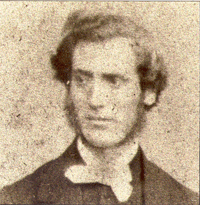John Percival (bishop)
| The Right Reverend John Percival | |
|---|---|
| Bishop of Durham | |
 | |
| Church | Church of England |
| See | Durham |
| In office | 1895–1917 |
| Predecessor | James Atlay |
| Successor | Hensley Henson |
| Orders | |
| Ordination | 1860 |
| Consecration | 18 February 1895 |
| Personal details | |
| Born |
27 September 1834 Brough Sowerby |
| Died | 3 December 1918 (aged 84) |
| Spouse | Louisa Holland, |
| Previous post |
Presidency of Trinity College, Oxford; Headmaster of Rugby School |
John Percival (27 September 1834 – 3 December 1918) was the first headmaster of Clifton College, where he made his reputation as a great educator. In his 17 years at Clifton numbers rose to 680. He accepted the presidency of Trinity College, Oxford to recover from his years at Clifton. It was from Trinity that he went to Rugby to become headmaster of Rugby School before becoming Bishop of Hereford.
Early life
Percival was born in Brough Sowerby, near Kirkby Stephen, Westmorland, England, and was brought up on his uncle's farm after the death of his mother when he was very young. He was educated at Appleby grammar school, before winning a scholarship to The Queen's College, Oxford in 1854. He obtained first-class degrees in classics and mathematics and was elected to a fellowship by the college in 1858. Recuperating from overwork in Pau, France in the following winter, he met Louisa Holland, whom he married in 1862.[1] Together they had eight children, six of whom survived to adulthood.[2] The most notable of their children was Launcelot Jefferson Percival who was an international rugby player, and later Deputy Clerk of the Closet to King George VI.
Career in education

He was ordained deacon in 1860 and was offered a position as a master at Rugby School by the headmaster, Frederick Temple. In 1862, Percival was appointed the first headmaster of Clifton College in Bristol, on Temple's recommendation. Percival made this new school into a leading public school and he was also involved with other educational work in the city, helping to found Clifton High School for Girls (established in 1877).[1] and University College, Bristol (1876).
Percival became President of Trinity College, Oxford in January 1879. Although he was not always happy as a college head, he was involved in the wider work of the university, chairing the committee that established Somerville Hall in 1879 and promoting the university's adult education work.[1]
In May 1887, Percival became headmaster of Rugby School. During his time as headmaster, he pursued a vigorous moral crusade. His leadership soon improved the prestige of the school. He attacked "idleness" and "loafing" and, concerned about "impurity", insisted that boys' football shorts should be worn below the knee and secured with elastic. He acquired the nickname "Percival of the knees" as a result.[1]
In 1888, Percival's appointment of Marie Bethell Beauclerc to teach shorthand to classes of one hundred boys was the first appointment of a female teacher in an English boys' public school and the first time shorthand had been taught in any such school.
Bishop of Hereford
Lord Rosebery, the Prime Minister, nominated Percival to be Bishop of Hereford in January 1895. Whilst Queen Victoria was opposed to the idea, since Percival was known to favour the disestablishment of the Church in Wales, Rosebery prevailed.[1] The Congé d'élire authorising Percival's appointment passed the Great Seal of the Realm on 18 February 1895.[3]
Percival's time in Hereford was affected by the death of his wife in 1896, and he had difficulties in administering the large rural diocese where his radical political views were often unpopular. Graham Neville characterises him as a 'Low-church Political Liberal'.;[4] in 1901 he publicly criticised the conditions and loss of life in the Concentration Camps of the Second Boer War.[5] He attracted criticism (including an excommunication by Frank Weston, the bishop of Zanzibar) when he invited nonconformists to take holy communion at Hereford Cathedral to mark the coronation of George V.[1] He had more success on a national level, elected as the President of the Educational Science section of the British Association, and championed the cause of adult education in particular – he chaired the first meeting of the Workers' Educational Association in 1903.[1] Percival hoped for the Archbishopric of York; indeed felt that it had been promised him, but was disappointed when Cosmo Gordon Lang was given the post in 1909.[6]
He retired to Oxford in 1917 and died the following year. He was buried in the chapel crypt of Clifton College.[1]
A house (internal division) of Cardiff High School for Boys was named in his honour.
References
- 1 2 3 4 5 6 7 8 Sadler, John (2004). "Percival, John (1834–1918)". Oxford Dictionary of National Biography (online edition). Oxford University Press. Retrieved 7 February 2008. (subscription required (help)).
- ↑ Temple 1921.
- ↑ The London Gazette: no. 26600. pp. 999–1000. 19 February 1895. Retrieved 8 February 2008.
- ↑ Neville 1998, p. 4.
- ↑ Neville 1998, p. 192.
- ↑ Neville 1998, p. 241.
- Neville, Graham (1998). Radical Churchman: Edward Lee Hicks and the New Liberalism. Clarendon Press. ISBN 978-0-19-826977-9.
- Temple, William (1921). Life of Bishop Percival. London: MacMillan.
External links
| Church of England titles | ||
|---|---|---|
| Preceded by James Atlay |
Bishop of Hereford 1895–1917 |
Succeeded by Herbert Hensley Henson |
| Academic offices | ||
| New title | Headmaster of Clifton College 1862–1878 |
Succeeded by James Maurice Wilson |
| Preceded by Samuel William Wayte |
President of Trinity College, Oxford 1879–1887 |
Succeeded by Henry George Woods |
| Preceded by Thomas Jex-Blake |
Head Master of Rugby School 1887–1895 |
Succeeded by Herbert Armitage James |